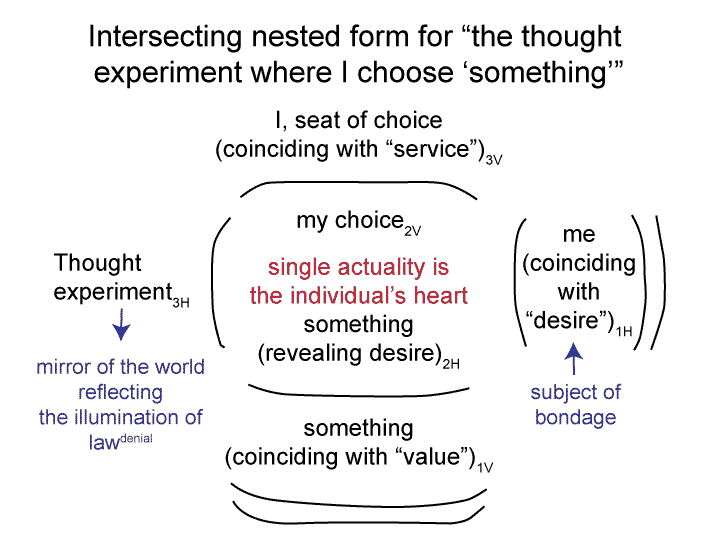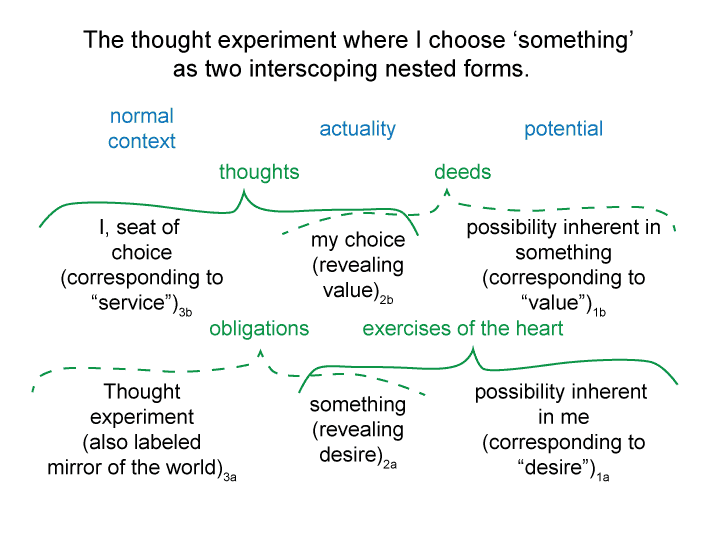Man and Sin by Piet Schoonenberg (1964) 2.3 MN
[In the corresponding intersection, the potential of me1H is situated by my heart2 through the normal context of the thought experiment3H or mirror of the world3H.
In this configuration, one can imagine how the vertical nested form may be regulated by the horizontal.
By contextualizing (permitting, inspiring, regulating, dictating, insisting, and so on) the heart2, the horizontal normal context3H influences the nested form containing I, seat of choice3V as well as the potential of something that underlies my choice1V.]
Man and Sin by Piet Schoonenberg (1964) 2.3 ML
[Let me list the upper level co-opposition.
Thoughts3b(2b & deeds2b(1b))
Thoughts encompass service. Deeds encompass value.
My values may or may not virtually emerge from and situate my desire.]
Man and Sin by Piet Schoonenberg (1964) 2.3 MK
[How does this resonate with Schoonenberg’s claim that we have the freedom to serve God or Satan?
Freedom goes with both the potential of the person1a plus an actuality, the something contextualized by the thought experiment2a.
The thought experiment3a reflects illumination by social elites (or, in general, the Zeitgeist).]
Man and Sin by Piet Schoonenberg (1964) 2.3 MJ
Summary of text [comment] page 83
[Let me list the lower level co-opposition.
Responsibility3a(2a & freedom2a(1a)
Corresponds to:
Mirror of the world3a( something2a( me1a))]
Man and Sin by Piet Schoonenberg (1964) 2.3 MI
Summary of text [comment] page 83
[Both the ancient Jewish and modern American infra(sovereign) religions possessed objects that bring all subjects into organization.
Both were and are committed to creating the thought experiement3a or a mirror of the world3a.]
Man and Sin by Piet Schoonenberg (1964) 2.3 MH
Summary of text [comment] page 83
[The elite’s desire to blame others for whatever bothers them2a is the ‘something2a’ that holds Americans in bondage.
Progressive experts thrive on representing the good ones and identifying and destroying the bad ones.]
Man and Sin by Piet Schoonenberg (1964) 2.3 MG
Summary of text [comment] page 83
[My own inadequacy in understanding how to fulfill God’s laws2a was the ‘something2a’ that held first century common-folk Jews in bondage.
Paul, on the other hand, originally felt that he counted among the elites.
He knew how to fulfill God’s laws:
Persecute the followers of Jesus.]
Man and Sin by Piet Schoonenberg (1964) 2.3 MF
[In the above examples, what do I desire?
I want to get along.
Therefore, the elites must never be satisfied with me.
They will always be morally superior in order to force me to pretend to desire things that I would never would desire on my own.
I desire to be left alone.
What I do to accomplish that desire validates the values that valorize elite moral superiority.]


